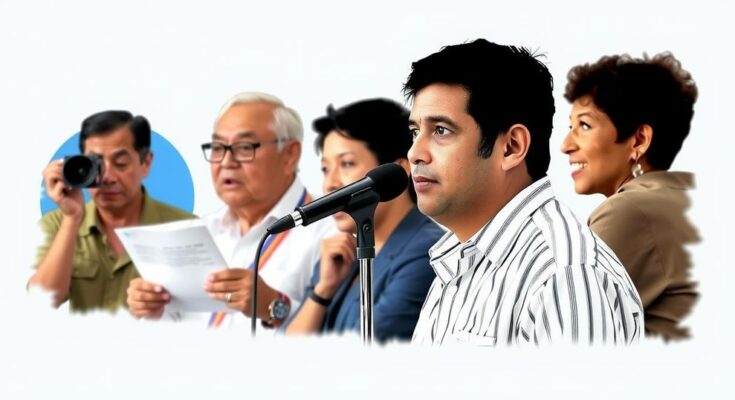Nicaragua plans to ratify constitutional reforms increasing presidential powers and state media control, mirroring tactics seen in authoritarian regimes. Under President Ortega, these changes threaten free speech and criminalize dissent, escalating repression against journalists. The United Nations warns that such measures will further undermine essential freedoms and the rule of law in the country.
In January, Nicaragua is poised to approve significant constitutional reforms that would enhance presidential powers and augment state control over media. If ratified, this change will empower the state to regulate media outlets, prohibiting influences from foreign entities and the dissemination of what it deems false news. Experts suggest this move mirrors similar actions taken by authoritarian regimes in Cuba, Venezuela, and former Soviet states, signaling a concerning trend in the Americas towards suppressing free speech. Carlos Jornet of the Inter American Association has remarked on the growing phenomenon of controlling discourse through social media, emphasizing that once information is labeled false by the government, avenues for defense or debate are effectively nullified.
This reform, prompted by President Daniel Ortega, also aims to extend his presidency from five to six years and redefine the vice-presidency to include his wife, Rosario Murillo, as co-president. To solidify Ortega’s power further, provisions will be made to strengthen police and military forces. The domestic climate for journalists in Nicaragua remains perilous, where many have fled exile to escape persecution. Reports indicate over 200 political prisoners were released last year, yet those dissenting against the Ortega regime face severe consequences, including torture and other violations of human rights.
Critics of these constitutional changes believe they legalize the d authoritarian grip Ortega and Murillo possess. Gustavo Porras from the Nicaraguan legislature has indicated that the reform will pass and dismissed opposition criticisms as trivial. Lucia Pineda Ubau of 100% Noticias asserted that these changes would facilitate targeted actions against independent journalism, aligning with earlier cybercrime legislation that could criminalize dissent. Tougher penalties for spreading purportedly false information are also included in the reforms.
The developments in Nicaragua reflect broader regional trends where authorities employ similar legislative tactics to silence opposition. In Venezuela, the government has effectively suppressed independent media, resulting in a dearth of reliable information due to the repression over the last decade. Likewise, Cuba has instituted laws that criminalize disinformation and impose stricter controls over online expressions, thus increasing the risk for journalists and ordinary citizens alike under accusations of inciting public disorder.
The United Nations High Commissioner for Human Rights has cautioned that these changes represent a substantial risk to the rule of law and fundamental freedoms in Nicaragua, stating that, if adopted, they will sound the death knell for civic liberties.
The article discusses impending constitutional reforms in Nicaragua that are anticipated to enhance presidential powers and state control over media. It traces similarities with strategies adopted by other authoritarian regimes, underscoring a worrying trend towards media suppression in the region. The reforms, drawing criticism from human rights advocates, signal an increased consolidation of power by President Daniel Ortega and potential risks for press freedom.
The constitutional reforms in Nicaragua signify a chilling departure from democratic principles, effectively legalizing authoritarian measures under President Ortega’s regime. This shift not only endangers free expression but also aligns with international patterns observed in authoritarian states like Cuba and Venezuela. As the reform seeks to consolidate power and silence dissenting voices, the implications for human rights and journalism in Nicaragua remain severe and concerning.
Original Source: www.voanews.com




